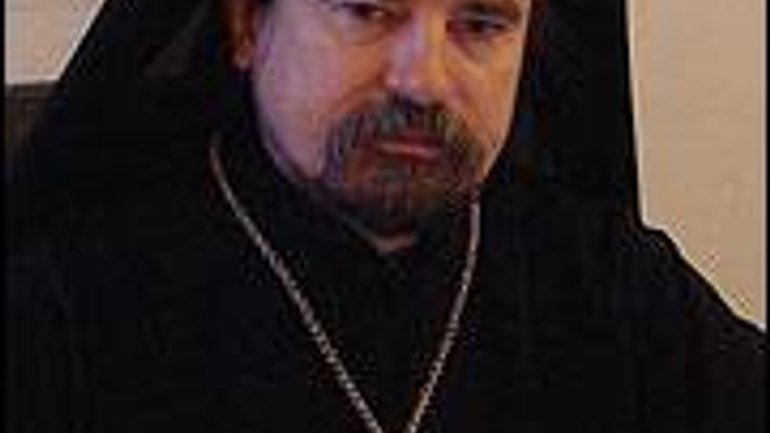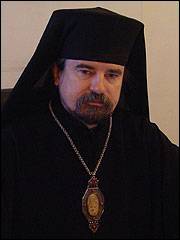Who Did Patriarch Kirill Come to Visit in Ukraine?

 Bishop IHOR (Isichenko), Archbishop of Kharkiv and Poltava of the Ukrainian Autocephalous Orthodox Church (UAOC)
Bishop IHOR (Isichenko), Archbishop of Kharkiv and Poltava of the Ukrainian Autocephalous Orthodox Church (UAOC)
An interesting thing: after the visit of the Moscow Patriarch to Ukraine a few Russian observers hastily talked about the new aspects of Ukrainian politics in the Russian Orthodox Church, about the respect to the Ukrainian people, its sovereignty, about brotherly sentiments displayed by the primate. Patriarch Kirill himself without unnecessary discretion already mentioned at a meeting with Russian President Medvedev about the crowds of people who recited during his trip “Kirill is our Patriarch” as if testifying the preservation of the spiritual community of the Ukrainian and Russian peoples.
For the Ukrainian who followed the visit and listened to the public addresses of Patriarch Kirill and the people surrounding him it is a rather strange interpretation. But for us it is hard to understand just how much the image of Ukraine is mythologized, even, and maybe, first and foremost, in the vision of our closest neighbors.
When Patriarch Kirill traveled across Ukraine, I read a book with an interview of Father Joakhym Badeni, a Polish Dominican, whose parents had an estate in Busk at the beginning of the 20th century. Fascinatingly describing his love to Ukraine, Father Badeni, the son of an Austrian diplomat and grandson of a Galician vicar, recalls the Buh, a long-bearded lirnyk, the steppes, which to him seemed to start somewhere nearby (beyond Busk), and all of this is associated in his conscious with images of the Senkevychev trilogy. A Russian adherent to Ukraine, most likely, will also search for personages from Gogol among us: simpletons, cunning-naïve and servile folk. Attempts of such a simple-minded, infantile people to build their own state life are perceived as inopportune. Though maybe rarely a rich ruler, having drank cognac after the sauna, begins to amicably ask our foreign worker somewhere on the construction of a dacha near Moscow: “Ivan, you are a khokhol, one of us, a Russian man, why do you need independence?” From the forced misfortune, our people learned to warm up in such situations to the interlocutor. And he does not presume that the Ukrainian Gastarbeiter has his national dignity and perceives his words by the image.
I had the impression that Patriarch Kirill himself and the Muscovite organizers of his visit compiled a program in account of this mythological country, where there live cinematographic Taras Bulbas ready to lay down their lives for the Muscovite tsar, protecting him from the Catholic enemies; a country which for years models in the conscious of Russian and ancient cultural stereotypes, and new propagandistic stamps. If there were no Yushchenko, then in this country there would be no myths, no UAOC with UOC-KP, no discussions about autocephaly. And this country would have probably been returned to Moscow under the status of an autonomous republic.
Taking a voyage in this country with modern technologies is easier than in Potemkin times. Beautiful Ukrainian monasteries create a wonderful background. Silent mimes take the place of the local clergymen. The role of the grateful and devoted flock is fulfilled by the staunch babushkas of different ages and colorful kozachkas who were driven in on buses. People of high standing of course complete the picture, who clearly demonstrated before the TV cameras their devotion to “canonical Orthodoxy.”
For the modern Ukrainian the ostentatious exuberance of the Devine Services, actively demonstrated the richness and influence of the Muscovite guests, solely political rhetoric, undisguised supremacy regarding the local traditions and ignorance of the real order of things led the patriarchal visit beyond the dimensions of real life in the sphere of the church “reality show.” Finally, contact with the flock was not anticipated and the assiduous protection of the participants of the visit from any sort of outside contacts. A series of reports about the visit of Patriarch Kirill in Ukraine appeared in the everyday life of millions of his parishioners, who continued to exist in a completely different dimension, more than a popular television series. Doubtfully, participants of the festive services can still now remember the words from the patriarchal sermons.
But there is one indisputable achievement of the patriarchal visit, which not only the faithful of the UOC-MP should be grateful, but also the faithful of the UOC-KP and various fragments the UAOC. This somewhat irrational visit forced us to ponder with an especially acuteness about the modern mission of the Orthodox Church and its perspectives. We will presume that with God’s will we will overcome the schism. The Ukrainian Orthodox Church will become one and will occupy a worthy position in the diptych of the National Church, somewhere there after the Russian one. And what next? Again return to the Middle Ages to the Byzantine “symphony” of the church and state? To care about the clan privileges of the clergy who increase the church property and political influence of the clergy? Return to the past or again come to the God-fighting revolution and the outburst of militant anti-clericalism?
The visit of Patriarch Kirill very clearly showed which Orthodox Church contemporary political and business elites would like to see. Furthermore, it also again brought to our attention the key problems of the Ukrainian Orthodox community: how would we like to see a united National Church in our future – not only from the view of a solely canonical or world-view, but also regarding the methods of its realization in the pastoral mission, relations of clergy and laymen, the language of the services and sermons in the broad culturological or even semiotic sense, social service, administrative order, organizations of personal management, and so on. By this it would be suitable to thank our recent Muscovite guest.









